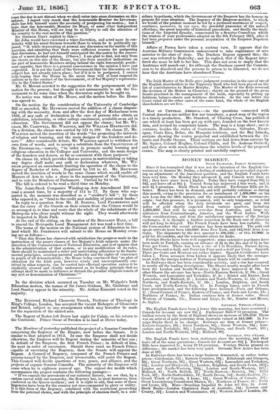The Moniteur of yesterday published the project of a Seriatim
Consultum concerning the Regency of the Empire, now before the Senate. It is similar to that adopted in 1813. In case the Emperor shall not decide otherwise, the Empress will be Regent during the minority of her son ; in default of the Empress, the first French Prince ; in default of him, the next in order of succession. Should there exist no French Prince capable of exercising the Regency, then the Senate will appoint the Regent. A Council of Regency, composed of the French Princes and persons named by the Emperor, and irremovable, will assist the Regent. This Council will decide questions of war, peace, and alliance, and the projects of organic Senatus Consults. The minority of the Emperor will cease when he is eighteen years of age. The exposé des motifs which accompanies the project contains the following passages- "If we consult the precedents of our national history, we see that, by a custom coeval with our monarchy, the Regency has, in most instances, been conferred on the Queen-mothers ; and it is right to add, that some Of these Regencies have been for the country not unaccompanied by glory or utility. It is this form of the Regency, combined with the restriction proceeding from the paternal choice, and with the principle of election itself, in a sub- sidiary hypothesis, which the Government of the Emperor has the honour to propose for your adoption. The Regency of the Empress-mother, to which we would at the present moment be led by a profound sentiment of respect, combines, moreover, in our eyes, the powerful guarantee of the natural affections, the great majority of historical precedents, and finally the tradi- tions of the Imperial dynasty, consecrated by a Senates Consulium which the wisdom of your predecessors adopted on the 6th February 181; after it had been prepared under the personal inspiration of the Emperor Napoleon himself."
Affairs at Parma have taken a curious turn. It appears that the Austrian Military Commission endeavoured to take cognizance of acts anterior to the state of siege. The Duchess Regent opposed this ; the case was referred to Radetzky ; and he replied, that if the Regent inter- fered she must be left to her fate. This does not Mein to imply that the Austrians will march out ; for although the Duchess caused the Commis- sion to be dissolved and the persons in prison to be liberated, we do not hear that the Austrians have abandoned 'Parma.


























 Previous page
Previous page